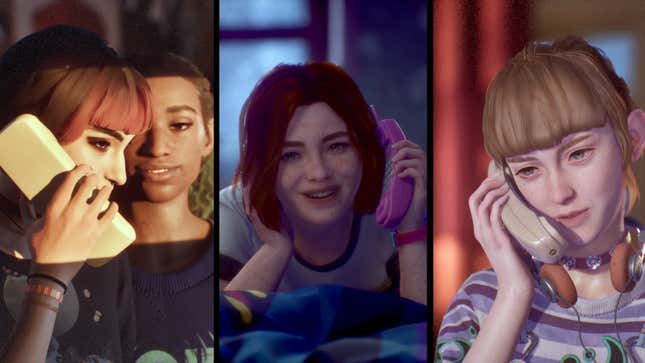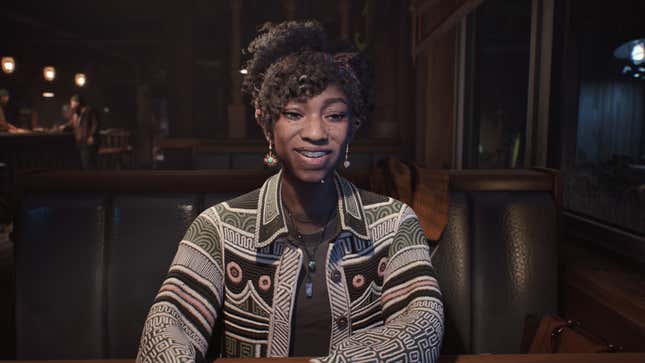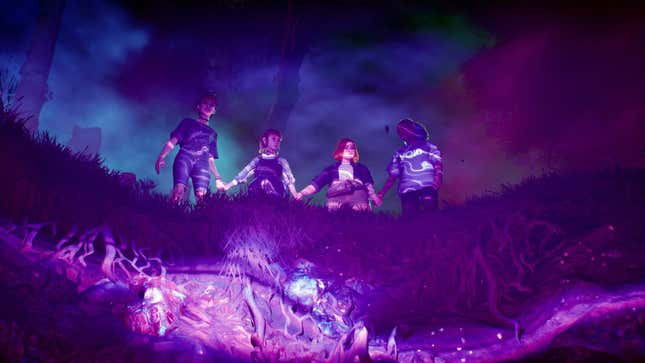I’ve finished the first half of Lost Records: Bloom & Rage, Don’t Nod’s latest supernatural teen drama, and it speaks to how well the game handles its dueling past and present storylines that even though I still don’t really know what the game is about, I’m nonetheless desperate to see what comes next. Don’t Nod hasn’t made a Life Is Strange game in six years, but Lost Records is more evocative of the original adventure game that put Don’t Nod on the map in 2015 than any released under the Life Is Strange name since. It wears its heart on its sleeve but keeps its cards close to its chest in the first of its two episodes, and I hope its final chapter will be as compelling as the first when it launches in April because I’m hooked.
Lost Records follows a group of four girls in a fictional small Michigan town called Velvet Cove during the mid-90s. Swann, a socially awkward high schooler whose only friend is her camcorder, is about to leave town for the Great White North. But as her family is packing their lives into boxes, she meets a new group of friends: the straight-laced ice cream shopkeep Autumn, the no-thoughts-head-empty punk Nora, and the angsty writer Kat. The girls are brought together while confronting a local bully, find an abandoned cabin they make into their secret hideout, and create a punk band together. They’ve all got big dreams beyond this small town and even if their time together is short, they’re all more than eager to hype each other up.
Order Lost Records: Bloom & Rage: Amazon | Best Buy | Walmart

Swann is one of the most compelling video game leads I’ve played in a while. She’s awkward, but spirited and passionate. All of that comes through in the dialogue choices you’re given with her. She can be shy and reserved, but she can also be a little bit of a freak who’s never gotten to let loose with other girls her age. So many of the prompts I got while talking to the rest of the group felt like, in choosing them, I was encouraging Swann to take up space. That can be as simple as letting out a joyful scream as the girls run through the woods, or as weighty as asking your friends if they even want you around.
Lost Records is a nostalgic game that leans into its ‘90s setting, but it also recognizes just how much stays the same as years pass, or even gets worse. The ‘90s story is told through interstitial flashbacks as the girls reunite and reminisce in their 40s. Despite decades between both sides of the story, Swann is still largely the same. As an adult, she’s a bookish nerd who, even after everything the girls have been through together, still doesn’t seem confident they even want her there. That’s the double-edged sword of looking back. You think of the “good ol’ days” and realize that the insecurities you felt then are still around. Maybe you fell back into old habits after so long away from each other, or maybe this is just who you always were.

Their time together revisiting the past isn’t all about warm recollections, though; it’s clear something happened in that fateful summer all those years ago that haunts the women to this day. That dark turn in the story begins with a scene in which Kat asks to recite lyrics she’s written for their group. The girls are sitting in a circle out in the woods away from anyone who might judge them, and I was surprised at how affected I was by the vulnerability of Kat just singing a song she wrote for her closest friends. I’m in my 30s, and I know that exposing yourself like that doesn’t get any easier with age. I moved to New York City two years ago and I’m still painstakingly analyzing every word I say to new connections I make in this city, like it’s a negotiation for their time and attention and I’m trying to make my case. But when you’re a teenager everything you feel is so raw, and every request to be seen by those around you feels like the riskiest thing you’ve ever done. That’s the barrier Swann is pushing against throughout Lost Records’ first half.
In the present day, I see Swann is still friendly with her old group, but each dialogue option feels high-stakes, despite all the years they’ve known each other. Making a choice in Lost Records is accompanied by an icon of either a whole or broken heart, signifying each girl’s reaction to it. Swann’s awkward demeanor and her clear desire to be accepted by her first real, close friends made every broken heart icon sting. The paranoia of saying the wrong thing to someone you still don’t know that well but would like to can stay with you long after your awkward teenage years are behind you, and Lost Records makes this agonizing reality a game mechanic. It’s so well executed that I winced for Swann whenever I said the wrong thing and maybe made one of the other girls sad or uncomfortable. It ate at me until the credits rolled, not unlike remembering a dumb interaction with a new friend hours after it happened.

Swann feels most herself when she doesn’t have to talk at all and is instead behind her camcorder taping all the group’s shenanigans. Lost Records trades Life Is Strange’s superpowers for a Pokémon Snap-like mechanic of recording your friends, nature, wildlife, and the citizens of Velvet Cove. Looking for enough shots to complete different themed videos can become a bit of a tedious collectathon, but I liked bringing out my photojournalism schooling to line up good shots and see the final montage. The system Don’t Nod uses to recognize if you’re recording the right thing is forgiving enough that you don’t feel restricted and can be expressive with your cinematography. It’s a mostly fun detour on your way to the game’s more impactful moments, but the best parts of Lost Records happen when Swann puts the camera down and has to relate to her friends without a buffer.
The first half of Lost Records only gestures at the bigger picture until it nears the end of its roughly six-hour run time. Something unspeakable happened in the ‘90s, and even as middle-aged women, Swann and her friends struggle to talk about it. But as they trace their footsteps to how they all found themselves back in Velvet Cove in their 40s, they will have to confront the truth, as much as some of them seem hesitant to do so. Don’t Nod has been gradually lowering the number of episodes in its episodic adventure games since the original Life Is Strange’s year-long run in 2015. So at the very least Lost Records won’t take too much longer. I just hope the second half lives up to the first when it launches on April 15.
Order Lost Records: Bloom & Rage: Amazon | Best Buy | Walmart
.
